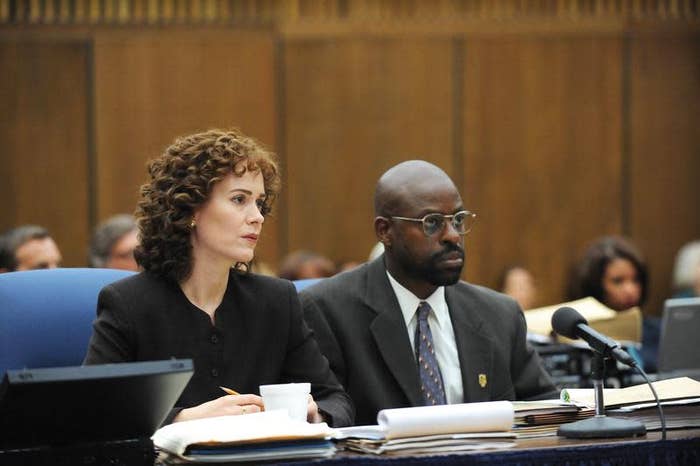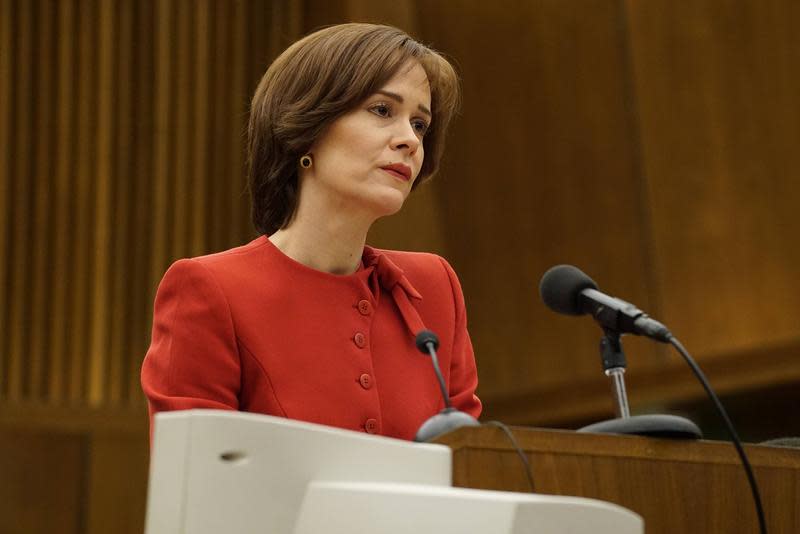
When news broke that Ryan Murphy would be at the helm of yet another FX anthology series, this one with a focus on historical true crime storytelling, it was difficult to know exactly what we were in for. But with his wildly successful first installment, The People v. O.J. Simpson, we saw the very best of what the ubiquitous showrunner has to offer. Based on Jeffrey Toobin’s book, The Run of His Life, the series reexamined one of the most widely publicized trials in American history, bringing us an intimate look at the private lives of those closest to the Simpson case.
Leading up to and following the murders of Nicole Brown Simpson and Ronald Goldman, the case was explored from all angles— showing the perspectives of Simpson, both families, the defense team, and of course, the prosecution. Lead prosecutor, Marcia Clark, played by the immensely talented human chimney Sarah Paulson, took center stage as Murphy’s protagonist on the mini-series. Clark’s narrative became the focal point around which most of the show revolved. Her child custody battle, her relationship with fellow prosecutor Chris Darden, and her tabloid scandals were all put on view, seemingly indicative of a bygone era of blatant media and institutional sexism. But is that really the case?
Upon first examination, it may be easy to dismiss—albeit with deep empathy—the jabs taken at Clark both in and outside the courtroom. This was the ‘90s, after all; it’s been more than 20 years since the trial first began, and conversations about gender parity have helped quash much of the outwardly sexist behaviors that ensued (sometimes appallingly) in her workplace setting—or so it would seem. Her hair, for example, played an important role in establishing her ability to be taken seriously in episode six, "Marcia Marcia Marcia," during which Clark was scrutinized from all sides after changing her style. Surely, we thought, while watching her be harassed for something as arbitrary as her ‘do (as opposed to her ability to do her job), this is merely a product of unchecked and old world sexism.

"I mean her hair is horrible . . . She knew it was horrible. The first time I met her, she said, 'I want to apologize for the hair,'" Paulson said. "That’s the first thing she said to me, and I was like, 'I really love you already,' and she knew it was bad but, you know, look, she was trying to put a man she believed to be guilty of murdering two innocent people behind bars . . . so what she looked like was really ancillary to the task at hand."
Upon learning of American Crime Story’s intention of picking up the O.J. trial for its first season, Clark toldThe Cut that she was "apprehensive" about the show’s portrayal of her—understandably so for a woman who was frequently deemed unlikeable during the murder trial of a beloved American icon. "I can’t tell you the PTSD that came over me," she said. "It was physical, so painful." In the same article, Toobin separately underscored that sentiment:
"Suddenly the mid-’90s seem like a long time ago, and one reason I think they do is that the media environment is almost unrecognizably different from 1994 and 1995. There was no internet, no Fox News, no MSNBC, no social media. So you had a kind of crude, broad focus without the compensations of alternative voices on Twitter and Facebook. So when the National Enquirer decided to make fun of Marcia Clark’s hairdo, there was no article in Slate or Salon or posts on Twitter saying 'Stop this sexist bullshit.'"
It’s true that social media has played an integral role in allowing for critical dialogue about systemic gender bias, but that’s hardly eradicated sexism in mainstream media. In yet another recent Page Six piece titled "Hillary Clinton’s $600 haircut," they write, "It is not known how much, or if, Clinton paid for the haircut, and her reps didn’t respond to requests for comment. But Clinton’s attachment to her hairstylists is well documented." Have we really conquered sexism in media when a woman who’s running for president isn’t allowed to have her hair cut—with her own money, mind you—in peace?
Like Clark’s ascribed media persona, Hillary’s elicited much of the same harmful, derogatory, and deeply gendered labels during her most recent campaign to win the White House. Time recently ran a piece exploring the gendered "double bind," which describes the way women are criticized in media, and the idea that there’s no winning when you’re a woman held to the double standards of likeability that don’t apply to men. "A double bind means you must obey two commands, but anything you do to fulfill one violates the other," writes Deborah Tannen, a linguistics professor at Georgetown University. "While the requirements of a good leader and a good man are similar, the requirements of a good leader and a good woman are mutually exclusive. A good leader must be tough, but a good woman must not be. A good woman must be self-deprecating, but a good leader must not be."

Alongside the widespread criticism of Marcia’s physical attributes (her hair, clothes, demeanor, etc.), came a hyper-sexualization of her figure. As Lili Anolik writes in Vanity Fair, the O.J. Simpson trial functioned as the inception of reality TV, and with it came a flood of prodding commentary on the lives of every involved party. As we pointed out in our episode 6 fact-check for American Crime Story, the leaked nudes from a vacation Clark shared with her ex-husband depicted in "Marcia Marcia Marcia" were, in fact, published by a tabloid and shared with the world amid the hellscape that was the Simpson trial.
The media fault-finding of Clark’s public persona notwithstanding, the opportunity to further critique her body was too juicy to pass up—not unlike the microscope applied to current public personalities and celebrities. Regardless of anyone’s feelings about Jennifer Lawrence or Kate Upton, their bodies were exposed to the world in last year’s mass leak of celebrity nudes, an event reddit had the gall to dub "The Fappening." Likewise, the same can be said of Kim Kardashian, perhaps one of the most famous women in the world at present, whose own nudes have been leaked on multiple occasions. But in yet another twisted turn of a gendered double bind, Kardashian’s cool dismissal of her leaks brought on its own unsolicited wave of criticism. Like Clark some 20 years ago, women of the present day who’ve been violated by the media are expected to remain passive, lest they bring more criticism upon themselves.
These are but a handful of glaring examples of double standards for the way we still talk about men and women in the media spotlight. To "lean in" makes a woman overbearing, meddling, or power-hungry; conversely, to show any kind of emotion makes her weak, untrustworthy, and unstable. If she wears something too racy, she invites criticism. If she wears something too conservative, she’s a shrew. If she cuts her hair a certain way, she willingly opens herself up to media scrutiny—she’s damned if she does, and she’s damned if she doesn’t. Since American Crime Story’s premiere, Marcia Clark has been heralded as a feminist hero for her demonstrated composure in the face of debilitating sexist garbage.
Of shooting the now iconic scene of Clark entering the courtroom with her hairstyle atrocity, Sarah Paulson recalled the embarrassment she felt when she walked on set—the humiliation, on a smaller scale, that Marcia herself experienced. "I felt so exposed," Paulson toldEntertainment Weekly. "I felt like someone had just come into the room and pulled all my clothes off." In examining the way we treat women who fall under today's microscope of public opinion, have we really come that far?

